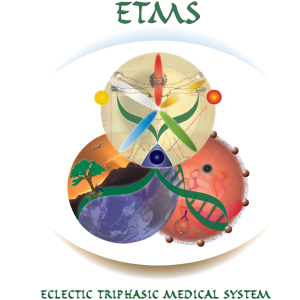The Eclectic Triphasic Medical System (ETMS)
Throughout more than twenty-five years of clinical practice, my philosophy and practice has evolved into the integrative model that I call the Eclectic Triphasic Medical System (ETMS). This system is a distinctive approach to healing that calls for the integration of traditional, wholistic medicine with modern, allopathic medicine—thus creating a custom-tailored approach for each individual that relies on scientific research, logic, common sense, and intuitive wisdom.
 It has been my privilege to accompany thousands of patients on their healing journeys. Because each person is a unique individual, there is clearly no “one-size-fits-all” approach that is appropriate. I have humbly learned the importance of embracing the mystery in healing while utilizing the best of scientific evidence-based medicine. From this vantage point, I developed the ETMS model, which is rooted in the American Eclectic herbal tradition, constitutional energetics, and contemporary clinical nutrition. At the same time, I am a disciplined and voracious scientific and medical researcher. This synthesis provides a framework for developing novel therapeutic strategies that incorporate the best of traditional, wholistic, and conventional medicines as supported by modern science. My goal is to provide patients with treatment options that include health building as well as disease-fighting tools. I want my patients to thrive, not merely survive.
It has been my privilege to accompany thousands of patients on their healing journeys. Because each person is a unique individual, there is clearly no “one-size-fits-all” approach that is appropriate. I have humbly learned the importance of embracing the mystery in healing while utilizing the best of scientific evidence-based medicine. From this vantage point, I developed the ETMS model, which is rooted in the American Eclectic herbal tradition, constitutional energetics, and contemporary clinical nutrition. At the same time, I am a disciplined and voracious scientific and medical researcher. This synthesis provides a framework for developing novel therapeutic strategies that incorporate the best of traditional, wholistic, and conventional medicines as supported by modern science. My goal is to provide patients with treatment options that include health building as well as disease-fighting tools. I want my patients to thrive, not merely survive.
The fundamental objectives of the ETMS approach are to strengthen the individual in a harmonious way and to lessen the vulnerability towards the development of degenerative disease. The modern medical model essentially views humans as machines comprised of parts that can be isolated, fixed, or replaced. Assuming that humans function like machines implies that disease is simply the result of the laws of nature, physics, and biology to which we are subject. In this view, medicine means that the doctor fixes something that is broken.
The viewpoint from which the ETMS practitioner operates is profoundly different. First, the ETMS is a model that requires acknowledging that we actively create, respond, influence, and heal ourselves. Our cells, organs, networks, and systems are dynamic, interconnected, and interrelated; they all contain the innate knowledge and ability to heal and nurture us when supported by a healthy foundation. This belief in the body’s inherent ability to heal and become whole and to overcome disease is fundamental to the ETMS. The role of the ETMS practitioner is akin to that of the conductor in an orchestra, constantly working to harmonize and align the elements of health so that the body can ‘sing.’
Secondly, the ETMS model places its focus on the whole of the body system rather than on the disease itself. For example, in the case of cancer, the ETMS model, unlike the modern medical model, is not focused merely on attacking the cancer without an attempt to examine the factors that allowed the cancer to arise in the first place. The ETMS practitioner evaluates the suitability of certain treatments for the patient, not only from the point of view of pathology, but also by considering the beliefs about cancer and cancer treatment held by the individual coping with a cancer diagnosis.
The ETMS emphasizes the practice of ‘healthy medicine.’ The primary goal is to bring the body into harmonious balance with nontoxic or low-toxicity, target-specific, disease-suppressing agents. This is achieved through the application of synergistic herbal and nutritional formulations (naturally phytochemically complex medicines), dietary therapeutics, and other specific therapies as indicated.
The ETMS is truly integrative in its wholism. My hope is that the fruition of the ETMS will be the future of modern medicine, removing ego and fear in favor of compassion, humility, wisdom, and love.
For more information about the ETMS, including training programs for health care professionals, please go to http://www.medericenter.org.

Hi Donnie, very powerful story, where do you train your students do you have therapists in the Netherlands or europe that we can go to.
Thank you